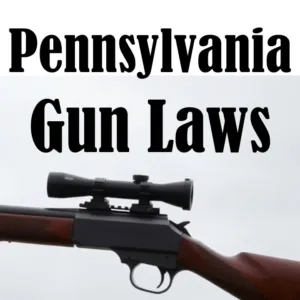Pennsylvania has a rich history of gun ownership, and the state’s firearm laws strike a balance between respecting Second Amendment rights and ensuring public safety. Whether you’re a Pennsylvania resident or a visitor, understanding the state’s gun laws is essential to avoid legal trouble and to lawfully exercise your rights. This guide covers key aspects of Pennsylvania gun laws, including purchasing, carrying, permits, and restrictions.
Pennsylvania Gun Laws Overview

Open Carry in Pennsylvania
Pennsylvania is an open carry state, which means individuals can openly carry firearms without a permit, with some exceptions. Open carry is allowed for anyone 18 years or older who is legally allowed to possess a firearm, except in the city of Philadelphia, where a permit is required for both open and concealed carry. It’s important to note that open carry is prohibited in vehicles without a permit, and there are several restricted locations.
Who Can Legally Own a Firearm in Pennsylvania?
To legally own a firearm in Pennsylvania, you must:
- Be at least 18 years old to purchase rifles and shotguns.
- Be at least 21 years old to purchase handguns.
- Not have been convicted of a felony or certain misdemeanors.
- Not have been convicted of domestic violence offenses.
- Not be prohibited from owning firearms under federal law.
- Not have been adjudicated as mentally incompetent or involuntarily committed to a mental institution.
Purchasing a Firearm in Pennsylvania
Pennsylvania residents can purchase firearms from licensed dealers without needing a state permit, though all handgun purchasers must undergo a background check. The process for buying a firearm differs slightly depending on the type of gun being purchased:
- Handguns: To purchase a handgun from a licensed dealer, you must complete an application, pass a background check through the Pennsylvania Instant Check System (PICS), and pay a transfer fee. Private handgun sales must be conducted through a licensed dealer or county sheriff’s office.
- Long Guns (Rifles and Shotguns): You can purchase long guns from licensed dealers without a permit, and private sales of long guns do not require a background check in Pennsylvania.
There is no waiting period for firearm purchases in Pennsylvania, and gun registration is not required, though background checks and records of sale are maintained by the state.
Concealed Carry Permits in Pennsylvania
Pennsylvania allows for concealed carry of firearms, but it requires individuals to obtain a License to Carry Firearms (LTCF). Without an LTCF, carrying a concealed firearm is illegal.
How to Obtain a License to Carry Firearms (LTCF):
- Be at least 21 years old.
- Submit an application to the county sheriff (or the chief of police in Philadelphia).
- Pass a background check, including a criminal and mental health history review.
- Pay the required application fee (typically around $20-$40).
- The sheriff’s office has 45 days to process your application and either issue or deny your permit.
A Pennsylvania LTCF is valid for five years and can be used for concealed carry in multiple states that have reciprocity agreements with Pennsylvania. However, it is crucial to check the laws of other states before traveling, as firearm laws differ from state to state.
Where Can You Carry a Gun in Pennsylvania?
While Pennsylvania is permissive in terms of open and concealed carry, there are several areas where carrying firearms is prohibited, including:
- Schools: Firearms are generally prohibited on school property, including K-12 schools, unless you have written permission from the school board.
- Government Buildings: Firearms are prohibited in courthouses, court facilities, and certain government buildings.
- Airports: You cannot carry firearms in certain areas of airports, particularly secure areas beyond security checkpoints.
- Private Property: Private property owners have the right to prohibit firearms on their premises. You must respect “No Firearms” signs.
- Philadelphia: Philadelphia has stricter gun laws than the rest of the state, and a License to Carry Firearms (LTCF) is required for both open and concealed carry within city limits.
Pennsylvania’s Stand Your Ground and Castle Doctrine
Pennsylvania has a Stand Your Ground law, meaning you are not required to retreat before using deadly force if you believe such force is necessary to prevent death, serious bodily injury, or a forcible felony. Additionally, Pennsylvania’s Castle Doctrine permits the use of deadly force inside one’s home, vehicle, or place of business without a duty to retreat if an intruder poses an immediate threat.
Firearm Restrictions in Pennsylvania
While Pennsylvania’s gun laws are relatively permissive, there are restrictions on certain individuals and types of firearms:
- Convicted Felons and Domestic Abusers: Individuals convicted of felonies or certain domestic violence offenses are prohibited from owning or possessing firearms.
- Mental Health: Those adjudicated as mentally incompetent or who have been involuntarily committed to a mental institution cannot own firearms.
- Assault Weapons: Pennsylvania does not have a ban on so-called “assault weapons,” but certain cities like Philadelphia have more restrictive local laws.
- Suppressors and Machine Guns: Suppressors (silencers) are legal in Pennsylvania, but machine guns and fully automatic firearms are heavily regulated and must comply with federal law, including registration and possession of a federal tax stamp.
Reciprocity with Other States
Pennsylvania has reciprocity agreements with several states, meaning that a Pennsylvania License to Carry Firearms (LTCF) is recognized in those states. Similarly, Pennsylvania recognizes concealed carry permits from certain other states. However, it’s important to check with local authorities when traveling, as reciprocity agreements are subject to change and laws vary widely between states.
Penalties for Violating Gun Laws in Pennsylvania
Violating Pennsylvania’s gun laws can lead to serious legal consequences. Some of the most common offenses include:
- Carrying a Concealed Firearm Without a License: This can result in misdemeanor or felony charges, depending on the circumstances.
- Possession of a Firearm by a Prohibited Person: Convicted felons, individuals subject to certain restraining orders, or those with domestic violence convictions can face severe penalties for possessing firearms.
- Carrying a Firearm in a Restricted Area: Violating location-specific restrictions, such as bringing a firearm into a school, government building, or secure area of an airport, can result in criminal charges and fines.
Conclusion: Understand and Follow Pennsylvania’s Gun Laws
Pennsylvania gun laws provide significant freedom to firearm owners, including the ability to open carry without a permit in most areas of the state. However, it is crucial to understand the limitations, particularly regarding concealed carry, restricted locations, and certain city-specific regulations, such as those in Philadelphia.
For anyone who plans to carry a concealed firearm, obtaining a License to Carry Firearms (LTCF) is highly recommended, not only for legal protection but also to take advantage of reciprocity with other states. Staying informed about Pennsylvania’s gun laws and ensuring compliance with them will help you exercise your Second Amendment rights responsibly.
FAQs About Gun Laws in Pennsylvania
1. Do I need a permit to open carry in Pennsylvania?
No, you do not need a permit to open carry in Pennsylvania, except in the city of Philadelphia, where a License to Carry Firearms (LTCF) is required for both open and concealed carry.
2. Can I carry a gun in my car in Pennsylvania?
Carrying a firearm in a vehicle requires a License to Carry Firearms (LTCF). Without a license, you may only transport firearms under specific conditions, such as going to or from a range or a repair shop.
3. Is there a waiting period to purchase a firearm in Pennsylvania?
No, Pennsylvania does not impose a waiting period on firearm purchases, but a background check is required for handgun purchases.
4. Are there any restrictions on purchasing ammunition in Pennsylvania?
No, Pennsylvania does not impose state-specific restrictions on purchasing ammunition beyond federal regulations regarding prohibited persons and age limits.
5. What is the penalty for carrying a gun without a license in Pennsylvania?
Carrying a concealed firearm without a license can result in misdemeanor or felony charges, depending on the situation. Penalties can include fines, imprisonment, and loss of firearm rights.
By understanding Pennsylvania’s gun laws and staying updated on any changes, you can ensure that you carry and possess firearms legally. Always consult legal professionals or local authorities if you have any doubts or questions about specific regulations.
